-
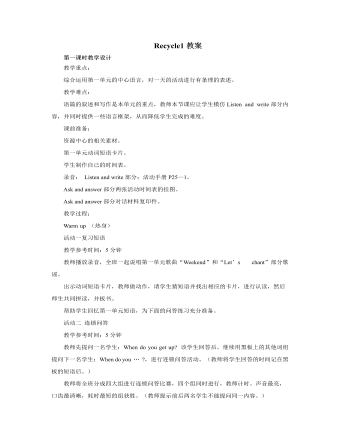
人教版新课标PEP小学英语五年级下册Recycle1教案(内容详细)
学生搜集中外重要节日及部分中外名人的生日所在的月份。教师准备相关节日及部分中外名人的图片或音像资料片。教师课前准备Let’s find out2的配图画好春、夏、秋、冬四个方框。录音:Listen and number。教学过程:Warm up (热身)活动一复习单词教学参考时间:3分钟(1)教师播放Let’s chant部分的歌谣,学生听一遍后跟唱。(2)出示带有各个月份特征的单词卡片。学生看图说出单词,并一起拼读其缩写形式。帮助学生在有节奏的说唱中巩固记忆单词,为在后面活动中学生能够熟练应用作铺垫。活动二 复习句子教学参考时间:5分钟(1)师生同唱Let’s chant部分歌谣“When Is Your Birthday?”。(2)教师引导学生看歌谣下面的翻滚过山车的动画,师生进行问答,如:When is the rabbit’s birthday? It’s in May. 等。教师示范后请学生进行Pair work,也可以展开竞赛的形式进行“连锁问答”。巩固有关生日问答的语句,为Let’s find out1的活动做准备。

人教版新课标PEP小学英语五年级下册What Are You Doing说课稿6篇
五、教学程序:下面我结合课件谈谈本节课的教学程序: 1. 课前热身:让同学们边说边做动作。这段Chant联系了两个内容,一是现在进行时,二是We’re having a party. We are happy. 这两点都紧扣本课的两个要点。2. Revision: Are you happy? Let’s do something happy and funny. Let’s play a game. What are you doing? I’m cooking, cooking. 全班分为四组,每组代表轮流提问:what are you doing ,下一组任何一位同学快速回答I’m cooking, cooking.并做相应动作。这一游戏不只复习了大量的动词和进行时,也让同学逐渐在竞赛中趋向兴奋的状态。3. Presentation: I’m happy today, Do you know why? Because it’s my birthday today.把同学的注意力引到我的身上。Look at me. What am I wearing today? I’m wearing a skirt. I am wearing a sweater.引出今天要掌握的单词wear与句型I’m wearing…,然后提问What are you wearing? What is he /she wearing? 同学刚开始回答时可能会用I am in …..?但回答过几轮之后他们就能够正确运用Wear这个词了。

人教版新课标PEP小学英语五年级下册This Is My Day说课稿4篇
六, 说教学难点1. 培养学生合作学习的能力.,同时注意培养学生学习英语的兴趣, 树立自信心.2,单词mountain引导学生分音节模仿读音,掌握拼写,强调字母组合ou 发( ),ai发( ).将单词grandparents分为grant和parents让学生掌握3,在小组讨论的前提下,在学生挖掘已有的知识点和新的词组七, 说教学准备Let's learn ,let's sing 和Let's chant的录音磁带.以及卡片go to bed get up have dinner eat breakfast play sports do morning exercises .以及短语卡片 climb mountains go shopping play the piano visit grandparents go hiking 以及卡纸八,说教法,学法为了突破这堂课的重,难点,根据小学五年级学生好奇,好胜,内敛,爱面子,表现欲旺盛等生理和心理特点,我主要采取了以任务型教学模式为主,以活动,合作为主线,让学生在教师的指导下,通过感知,体验,实践,参与和合作,游戏感悟等多法并用的方式组织教学.彻底改变传统的"讲授"的教学模式,促进语言实际运用能力的提高.
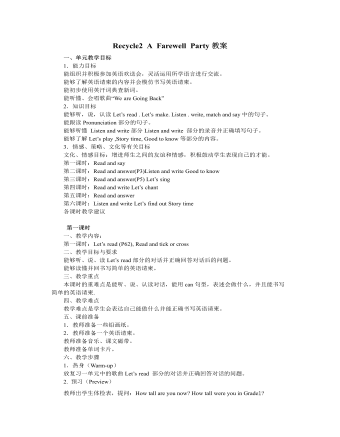
人教版新课标PEP小学英语六年级下册Recycle2 A Farewell Party教案
3. 新课呈现(Presentation) Let’s make (1)教师说:Miss White is making a book about her students. So she can remember them well.Who are the students? 请学生独立或分小组朗读四段短文,解释学生不理解的句子,然后说:There are four pictures below. Would you like to help Miss/White glue the pictures? 教师知道学生完成图文搭配的练习。 (2)教师发给每名学生一张铅画纸,说:Now please draw a picture of your best classmate. Then describe him or her.学生画一副最要好的同学的肖像,并在傍边配上对该同学的英语介绍。 学生上讲台介绍自己最要好的同学,请其他学生猜是谁,看谁说的生动又贴切,教师给予评价时注意强调第三人称单数形式的使用。 Story time 教师向学生展示Story time部分的教学挂图,指着最后一副图中的Zoom 和 Zip说 Look at the picture. Zoom and Zip are sad. They are saying goodbye to each other. Now let’s see What happened. 学生同桌之间合作阅读或是,然后教师提出问题Where is Zip going? Is this good news for zoom ? What grade is Zip going to be in? 教师放录音,学生录音跟读故事,然后再分角色朗读.

人教版新课标PEP小学英语六年级下册Last Weekend说课稿9篇
一、教学内容分析1. 教学内容介绍:.本课是一节复习课,复习内容为Last Weekend A B 两部分。教学主要是10个词组和2个句型,并结合六年级学生即将毕业,在原有教材的基础上融入了大量有关周末活动的句型和短语。使学生在“周末活动”这一话题下,尽可能多地滚动复习更多相关的动词短语。本课要掌握的短语和句子有Words and phrases: watched TV; washed clothes; cleaned the room; played football; visited grandparents; read a book; went to a park; went swimming; went hiking; went fishing;Key sentences: What did you do last weekend? I played football; Did you read books? Yes, I did. No, I didn’t.2. 知识的前后联系:Last weekend的话题是周末活动,关于日常活动的话题已在小学课本中多次出现,例如在B4U2; B5U2; B5U4; B6U1; B6U5; B7U3;B8U3中7次出现。在进行U3 last weekend的复习中,对周末活动的内容要进行深化。除了要求学生能够“四会”掌握本单元的词汇外,还应注意培养学生听、说、读、写的能力,让学生在一定的情景中在句中运用单词,在篇章中运用句子,赋予单词、句子特定的意义,而不是孤立地学习单词和句子,使学生一看到这些单词就能在一定的情景下使用,进而组合这些句子形成篇章,从而培养学生综合运用语言的能力。

人教版新课标PEP小学英语六年级下册My Holiday说课稿5篇
本课时是本单元的第二课时,属对话课,它是对第一课时词汇课学习的一种巩固和延伸,同时也是下一课时阅读课的铺垫,因此起着承前启后的作用。二、学情分析通过三年多的英语学习,大部分学生已具备了一定的英语学习能力,他们能够听懂有关熟悉话题的语段,能与教师或同学就熟悉的话题交换信息,能读懂简短的的语篇。对于本文中的重点语法项目一般过去时,属于上一单元已学内容,本单元旨在继续巩固其用法,所以学生对该内容不是很陌生。三、教学方法及手段1.教学方法小学英语教学应该把培养学生的学习兴趣、调动学生学习英语的主动性作为教学重点,根据学生的认知规律,本课在应用任务型教学法的大前提下,利用情景教学法以及TPR教学法相结合,以学生为中心,以交际为主线,通过一系列的教学活动吸引学生的注意力,努力让学生积极参与,学以致用,并在用的过程中发展语言能力、思维能力以及交流合作的能力。

人教版新目标初中英语七年级下册How was your weekend教案2篇
Teaching Goal:1. General aims:Talk about recent past events2. Particular aims:A. Language Focus.Talk about recent past events and think of the past events.B. Language goalsHow was….?It was …What did …do over the weekend?C. Language structures:(1). How was your weekend? I was great. Pay attention to no form.(2). What did you do over the weekend? I played soccer. We went to the beach.D. Useful words and phrases:Words: was, did, went, beach, over, project, test, wasn’t, false, number, geography, spend, week, most, mixture, their, had, little, cook, read, saw, change, everyone, sit, sat, no, anythingPhrases: did one’s homework, played soccer, cleaned my room, went to the beach, played tennis, went to the movies, on Saturday morning, over the weekend, cook … for, what about, do some reading, have a party, talk show, go shoppingE. Grammar language:Present simple past tenseRegular and irregular verbsF. Learning strategies:Tour and holidaysG. Interdiscipinary:H. Emotion and manner:Teaching time: 5 periodsTeaching procedures:Period One教学步骤、时间 教师活动 学生活动 媒体应用Step 1Free talk 3’ Ask some questions like:Who’s on duty today?What’s the weather like? Answer and talk about something.让同学们回答下列问题1. Do you like weekend? (Let some students answer)It takes them three minutes to talk about the question.2. Why do you like weekend? (let the students answer) Most of the students like the weekend此时教师用汉语问:“在周末期间问你干了什么?这句话用英语这么回答?Let the students guess.At last the teacher give them right answer3. What did you do over the weekend?(板书、学习)

人教版新目标初中英语七年级下册Where is the post office教案2篇
Period 2 (3a----Section B 2c)Preview(Pre-task): Key points: What laAdd another information about their pen pals----their language on the cardnguage does she/he speak?She/He speaks....Does she/he have any brothers and sisters? Does she/he speak English?Preview(Pre-task): Add another information about their pen pals----their language on the cardKey points: What language does she/he speak?She/He speaks....Does she/he have any brothers and sisters? Does she/he speak English?Step 1 Revision1.Revisionand dictation of the new words 2.Revise the drills they learned yesterday.(by pairwork and grammar exercise)Step 2 Leading-inT has a conversation with one student. The conversation is following:---Do you have a pen pal?---Yes, I do.---What's your pen pal's name? ---His/Her name is....---Where is your pen pal from? ---He/She is from...---Where does he/she live? ---He/She lives in....---What language does he/she speak?He/She speaks...Write the new words on the Bb. They are following: EnglishChineseJapaneseFrenchStep 3 LearnLearn the new words with the whole class.Finish 3a with the students3b Pairwork T still does an example with one student Then the Ss practise in pairs. The example is following:--Curry Muray is my pen pal. He is from the United States.---What language does he speak?
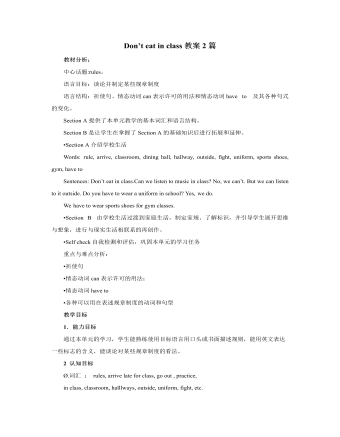
人教版新目标初中英语七年级下册Don’t eat in class教案2篇
Don’t fight. =You can’t fight. (板书,教读)教师把这些句子板书在黑板上,并请学生大声整齐地读祈使句和“can’t”句型,并让学生注意两种句型表达形式的不同和转换,“Don’t …=You can’t…”;并对学生说:These are our school rules. (板书,教读) You can’t break the school rules. Don’t break the school rules.(板书,教读)步骤3 :Practicea. T: Now, each of the students is breaking one of these rules.Please finish 1a.学生看图,完成1a的内容,检查答案并大声朗读校规。b. 听录音,完成1b,选出四位学生都违反了哪条校规;听之前,学生要读会英文名。c. 请两位学生朗读1c部分的句型;要求学生两人一组对话表演,SA扮演外校转来新生,SB告知本校校规。(学生可经过讨论,多说出他们想到的校规,不必只限于书上;教师应给予帮助)2) 第二课时(2a~4)步骤1 :warming up of revisionT: What are the rules at your school?学生使用“can”或祈使句表达各条校规;其中老师可引出“eat in the cafeteria outside”的表达。步骤2 :Practicea.T: Christina is an exchange student. She doesn’t know the rules. Let’s listen, what activities they’re talking about?学生听第一遍时,完成2a;第二遍时,完成2b;b. 请学生领读2c部分,看着2a完成的表格,理解2c活动的要求;分成小组针对2a进行问答;
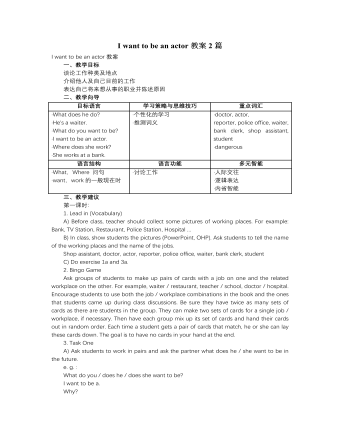
人教版新目标初中英语七年级下册I want to be an actor教案2篇
三、教学建议第一课时:1. Lead in (Vocabulary)A) Before class, teacher should collect some pictures of working places. For example: Bank, TV Station, Restaurant, Police Station, Hospital ...B) In class, show students the pictures (PowerPoint, OHP). Ask students to tell the name of the working places and the name of the jobs.Shop assistant, doctor, actor, reporter, police office, waiter, bank clerk, studentC) Do exercise 1a and 3a.2. Bingo GameAsk groups of students to make up pairs of cards with a job on one and the related workplace on the other. For example, waiter / restaurant, teacher / school, doctor / hospital. Encourage students to use both the job / workplace combinations in the book and the ones that students came up during class discussions. Be sure they have twice as many sets of cards as there are students in the group. They can make two sets of cards for a single job / workplace, if necessary. Then have each group mix up its set of cards and hand their cards out in random order. Each time a student gets a pair of cards that match, he or she can lay these cards down. The goal is to have no cards in your hand at the end.3. Task OneA) Ask students to work in pairs and ask the partner what does he / she want to be in the future.e. g. :What do you / does he / does she want to be?I want to be a.Why?Because it's (adj).B) Vocabulary: Section B, 1a4. Homework 1.2.
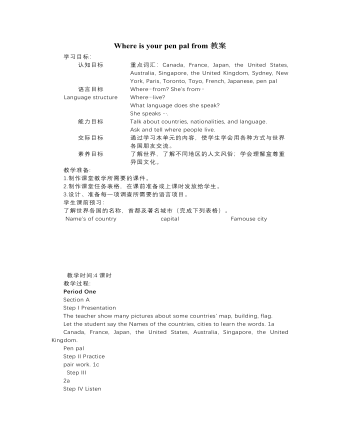
人教版新目标初中英语七年级下册Where is your pen pal from教案
2.1Match the country with the language.Step II Reading3a? let the students read the letter fast and answer the questions.? Let the students ask more questions about the letter as possible as the can.Step III Writing3b.Step IV. Pairwork2cStep V Listening2a, 2bStep V. HomeworkExercises book(1) P3Exercises book (2) P3Period FourStep I . Dictate the words and sentences in Unit1.Step II. Self-checkStep III. Check the answers for Exercises book in the unit.Step IV. Home workRevise and preparation for unit 2.教学反思:通过本单元的学习,学生基本可以谈论人们的国籍,居住城市及其所说的语言,通过书信方式去介绍自己并寻找笔友。但在涉及到国外的一些城市时,学生对这方面的知识相对欠缺,能介绍的城市并不多,也反应出学生课前预习不充分,这跟学生学习条件也有关,大多数学生无法通过网络获取所需信息。因此,在以后的教学中要多指导学生通过计算机网络获取信息,拓宽知识面。
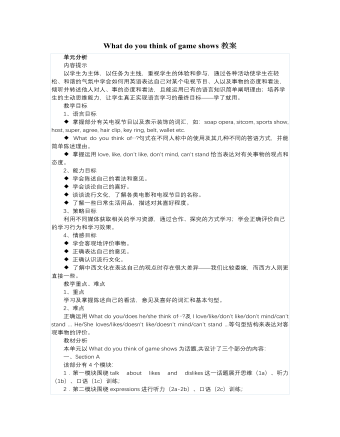
人教版新目标初中英语七年级下册What do you think of game shows教案
五、教学Section B-2c1. Pair work: What do you think of the belt/sunglasses/…? What does your father/mother/… think of your scarf/belt…?2. Group work(1). Teacher shows some different kinds of school uniforms (制服)and asks : “ What do you think of your school uniforms? If you have a chance to choose your school uniforms, what kind would you like to choose?”(2). Discuss in groups.(3).Get some Ss to report in class.说明:这一步旨在让学生运用已有的语言知识谈论对事物的看法和意见,并简单阐明理由,培养学生的主动思维能力和运用英语的能力。六、教学拓展调查电视节目的收视率任务:调查你周围的人对现在各种电视节目的反响。活动过程:1.教师布置任务,让学生调查周围的人(包括他的亲戚朋友和邻居)喜欢收看哪方面的电视节目。2.学生进行调查活动,运用本单元所学的句型What do you think of….? (Why?)What's your favorite game shows?What do you think of talk show?I doesn’t mind it.I like it.I love it.I can’t stand it.3.记录下排在前10位的TV Program,填写调查表,比较其收视率。
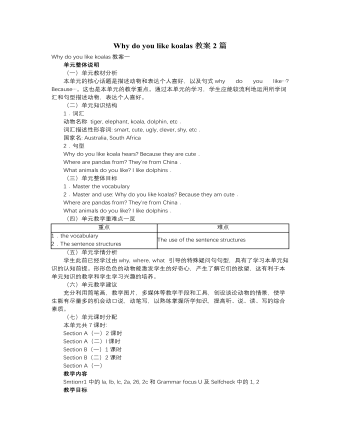
人教版新目标初中英语七年级下册Why do you like koalas教案2篇
单元整体说明(一)单元教材分析本单元的核心话题是描述动物和表达个人喜好,以及句式why do you like…? Because…。这也是本单元的教学重点。通过本单元的学习,学生应能较流利地运用所学词汇和句型描述动物,表达个人喜好。(二)单元知识结构1.词汇动物名称 tiger, elephant, koala, dolphin, etc.词汇描述性形容词: smart, cute, ugly, clever, shy, etc.国家名: Australia, South Africa2.句型Why do you like koala hears? Because they are cute.Where are pandas from? They're from China.What animals do you like? I like dolphins.(三)单元整体目标1.Master the vocabulary2.Master and use: Why do you like koalas? Because they am cute.Where are pandas from? They're from China.What animals do you like? I like dolphins.(四)单元教学重难点一览(五)单元学情分析学生此前已经学过由why, where, what 引导的特殊疑问句句型,具有了学习本单元知识的认知前提。形形色色的动物能激发学生的好奇心,产生了解它们的欲望,这有利于本单元知识的教学和学生学习兴趣的培养。

人教版新目标初中英语七年级下册I’m watching TV说课稿5篇
“Go for it”教材有一个比较明显的编排特点,那就是每单元由Section A , Section B 和 Self Check三大版快组成,同时每个版快又由a, b , c 三小部分构成,内容循序渐进,符合学生的认知规律,教材又图文并茂,既能吸引学生的注意力,又能激发学生的学习兴趣,每一小部分中的C部分又是pairwork,培养了学生的合作意识,每一小部分又有听力训练,培养了学生的听说能力。Section B中的3a, 3b 又能培养学生的读写能力,本单元的综合语言知识能力的运用,又能在此体现出来。本单元是新目标英语七年级下 Unit 5。主要围绕“What are you doing?”这一主题展开各种教学活动,并以这一主题引出现在进行时的一般疑问句,否定句以及特殊疑问句等语言功能。本单元旨在创造一个轻松、愉快的学习、交流环境,通过听、说、读、写来培养学生综合运用这些知识的能力。并让学生能在“做中学”(learning by doing),通过有限的课堂实践活动,注意观察别人的行动,能准确地用英语来表达。
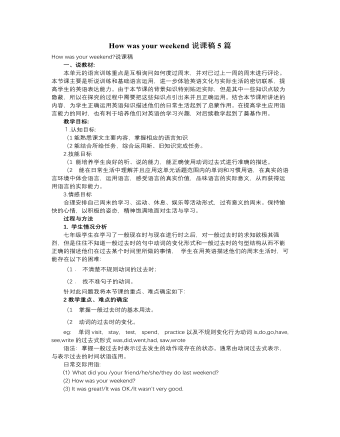
人教版新目标初中英语七年级下册How was your weekend说课稿5篇
(一)说教材与教情从本单元的题目How was your weekend?就可以知道本单元的语言目标是讨论曾经的活动或过去发生的事件,要求学生掌握的语法知识就是一般过去时。一般过去时这一时态在Go for it!这套书里这是第一次出现,因此要让学生把一贯以来他们所熟悉的一般现在时暂时搁浅,而用新学的一般过去时来表述发生的事件,无非是本单元的重点也是本单元的难点所在。要攻克这一重难点的关键,我认为在于能使学生对动词的过去时具备一定的熟巧度,并且这种熟巧度不仅应该表现在听说能力上,也应该体现在阅读和写作能力当中;不仅要在听和读的语言输入过程当中能够对这一时态有较强的敏感度,也要在说和写的语言输出过程中能够比较自然和自如地运用这一时态。对一般过去时在语言中运用的这种熟巧度实际上也就是本单元预期达到的语言技能目标。在本单元整体的知识和技能的大目标下,本课时作为本单元的第三课时,也就是本单元最后一个课时,它所覆盖的课本内容是Section B中的听力、阅读和写作。
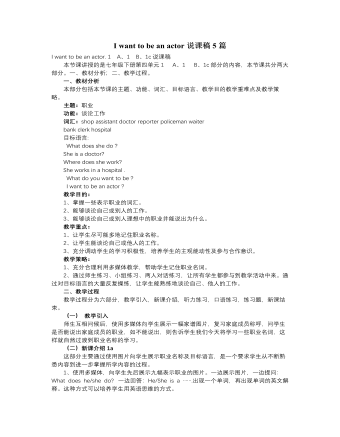
人教版新目标初中英语七年级下册I want to be an actor说课稿5篇
五. 教学过程1.预习展示(Review)在幻灯片上写出预习目标,然后让他们展示他们自己所预习的有关职业名称的词汇. 小组派代表发言.(设计目的:吸引学生注意力,活跃课堂气氛。使课文引入自然)2.检测成果(Checking)(1)展示本课时的单词图片,让学生快速完成。(2)让同学领读,齐读,男女同学读,在齐读。(设计目的:巩固单词的读音,以及纠正错误的读音,加深记忆力.)3.学习新句型(Presentation)用幻灯片出示重点句型,让学生观察、齐读、what do you do ?I’m a student.What do you want to be ? I’m want to be an actor.这些重点句型。(设计目的:培养学生认真观察动脑思考学习如何就职业提问,以及对自己的理想职业进行提问。)4.练习句型(Pattern drills)你是做什么的?What do you do ? 你将来想做什么? What do you want to be ?
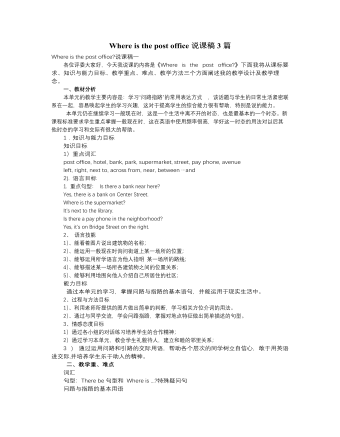
人教版新目标初中英语七年级下册Where is the post office说课稿3篇
Vocabulary:post office, restaurant, bank, supermarket, avenue, pay phone, park, dirty, clean, left, right, next to, across from, near, between, in front of, behindRecycling: hotel, street, new, big, small, busy, Do you want to…?Learning Strategies:Using what you knowDeducingPersonalizingSection ACreate plots and scenes to guide the new lessonThe main content is to learn to ask for and give directions in conversations by introducing some buildings in Section A, so we can adopt the Audiovisual Guiding Method: At first ,review the prepositions that the students have learned, then the teacher can teach some nouns about buildings by showing some pictures or projecting flashcards about some buildings.1. Show a picture of a bank.T:Look at this picture. What place is it ?S:It is a bank.T:Spell it.S: B-A-N-K .Teach other new words : post office, park, supermarket, payphone, street, .Show a map and let students practice in pairs.Is there …… ?Yes, there is. /No, there isn’t.2. Consolidation: Tell us the way to your school.T: Where is the …?S: It’s ….Teach the prepositionsNext to,across from,near,between,in front of,behind.Step1: .Learn some nouns about buildings first, and then the teacher communicates with the students.
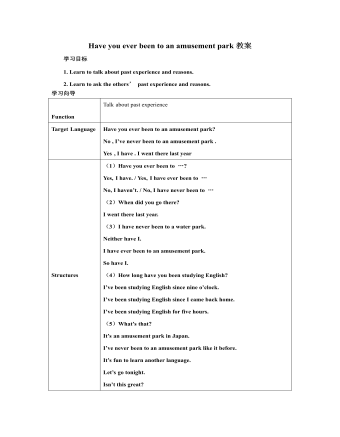
人教版新目标初中英语八年级下册Have you ever been to an amusement park教案
(1)Have you ever been to …? Yes, I have. / Yes, I have ever been to …No, I haven’t. / No, I have never been to …(2)When did you go there? I went there last year. (3)I have never been to a water park. Neither have I. I have ever been to an amusement park. So have I. (4)How long have you been studying English? I’ve been studying English since nine o’clock. I’ve been studying English since I came back home. I’ve been studying English for five hours. (5)What’s that? It’s an amusement park in Japan. I’ve never been to an amusement park like it before. It’s fun to learn another language. Let’s go tonight. Isn’t this great?space museum, amusement park, water park, South America, Peru, Holland, European culture, tour guide, flight attendant, musical instrument, more than, be from, get to, take lessons, neither, discover, graduate, change
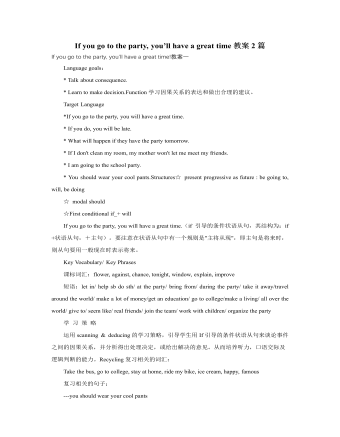
人教版新目标初中英语八年级下册If you go to the party, you’ll have a great time教案2篇
区分宾语从句、定于从句和状语从句宾语从句和状语从句,都叫做主从复合句。宾语从句主要是中考必考的,是初中阶段必掌握的从句,宾语从句主要是掌握三要素,所谓宾语从句,就是宾语在主从复合句当中充当宾语的一个句子,叫做宾语从句。主句的谓语动词是及物动词,后面如果是词或者是短语的话,是简单句,如果是句子的话,肯定是宾语从句。I know that he good at English.就是宾语从句,三要素,一要素是要注意连词,连词一共学了三类连词,一类连词是that口语当中可以省略,就像刚才说的那一句,I hear he is good at English.还有疑问代词、疑问副词,how where when,疑问代词、疑问副词。还有一类连词weather是否的意思,不是状语从句当中的如果,这一定要和如果区分开,这是是否。I don't know if he interested at English。宾语从句要注意if是连词。第二要素是语序,要用陈述举语序。比如说你家有几口人,我们都说How many people are there in you family?但是这是简单句,一旦说成宾语从句,你可以告诉我你家有几口人吗?Could you tell me how many people there are in you family ?

人教版新目标初中英语八年级下册He said I was hard-working教案2篇
This activity introduces some new vocabulary and provide oral practice using the target language.Task 1 . Ask four students to stand in front of the class, and the teacher asks them the following questions as a reporter.1.What are you going to do when you grow up?2.What are you going to do next week?3.What are going to do after school?The students will give different answers, then ask a good student to report what they said.I am going to e a doctor.What did she say?----------She said she was going to be a doctor.I am going to have a party on Friday night.What did he say?-------He said he was going to have a party on Friday night.I am going to do my homework.What did she say ?------ She said she was going to do her homework.I am going home after school.What did she say?-----She said she was going home after school.Say In this unit we are going to learn to use words like to report what someone said.Task 2. Read the instructions. Then ask a student to read the four questions. And write the words on the Bb. Explain what soap opera is.Task 3. Ask the students to Look at the pictures, point out the TV screens in the picture. Ask one girl to read what Marcia said.What did Marcia say? She said She said she was having a surprise party for Lana on Friday night. Repeat the other pictures in the same way.Activity3. Listen and number the pictures in activity 1a.